How can we reduce knife crime in London?published at 10:35 GMT 23 November 2023
That marks the end of the first half of the discussion.
The participants will now give their thoughts about what can be done to cut knife crime in London.
BBC Radio London's Eddie Nestor spoke to 13 young people about their experiences with knife crime
Jess Warren
That marks the end of the first half of the discussion.
The participants will now give their thoughts about what can be done to cut knife crime in London.
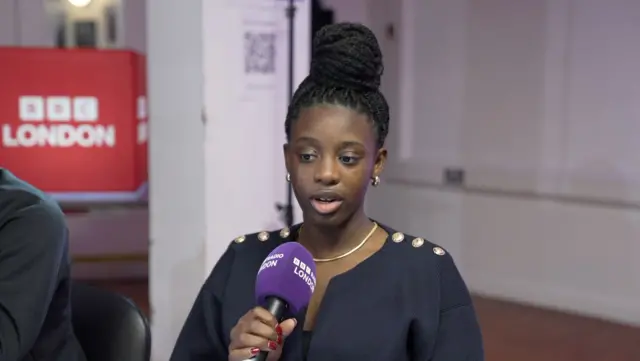
Twenty-one-year-old Reannah says the discussion so far is showing a "normalisation of loss of life".
"Everybody talks about it like it's normal," she says. "There doesn't seem to be a value on life and on young people's lives.
"It's quite scary, it shouldn't be something that we should be able to just be speaking about."
She adds that having a teenage sister who is the same age as Elianne Andam was when she died was "too close to home".
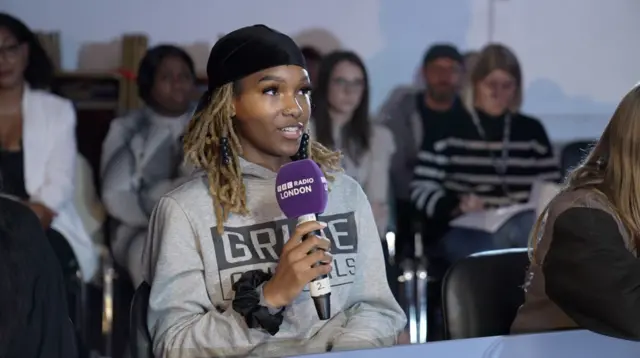
Nicole says she is doing a "social media fast" as it "hurts" to see stories about killings when she goes online.
"There's always going to be something bad that you'll see," she says. "Even the situation with Elianne still comes up now. And it still kind of hurts."
"When you have a busy day and you realise you haven't been on your phone all day, you realise how good your day has been because you haven't been on your phone," she adds.
Carrying on the discussion about Elianne Andam's death in Croydon, Tegan and Charlotte say they feel more at risk of becoming a victim of knife crime as a result.
"You feel more affected by it because you're suddenly part of the target," Tegan tells Eddie.
Charlotte adds that she now feels "more vulnerable on the streets", and she isn't surprised when she hears about teen stabbings.
"We hear about it so often it's become normalised - people dying on the streets."
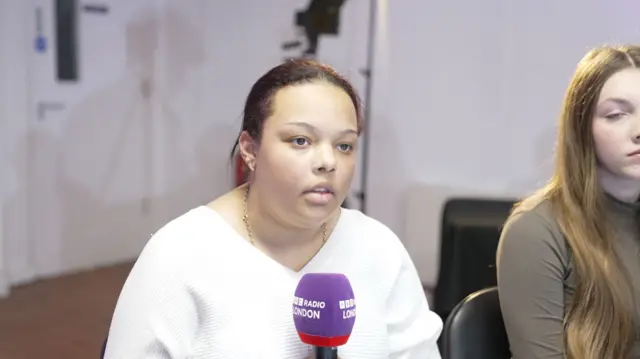
Tegan, 14, says she first heard what happened to Elianne Andam, who was fatally stabbed as she made her way to school in Croydon, on Snapchat.
"A lot of people that I go to school with had known the girl and had posted it on their story like 'RIP' and stuff like that," she says.
This happened before news outlets such as the BBC had formally identified Elianne as the victim, Tegan adds.
"Social media is one of the main reasons that people find out about knife crime and gangs," she explains.
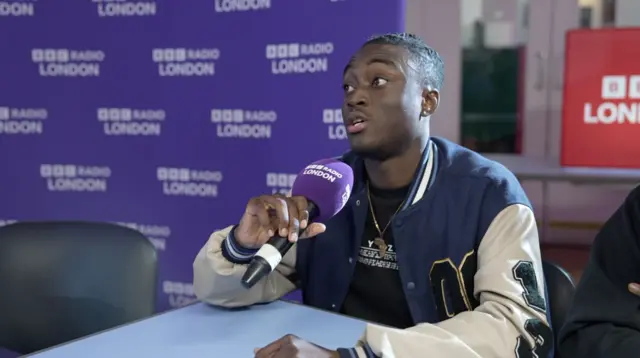
Selorm, 20, says when he was in school, some pupils would bring blades with them.
"I'd be in school, and there would be people who wouldn't have a pen on them, but having a knife on them was the norm," he says.
He adds that if young people are not embraced by the community, it's more likely to carry a knife.
"There's a saying that goes around in my family: 'If a child is not embraced by the village he'll burn it down.'
"If a young boy is not embraced by his community, he's not looked after, whether that's in the family, whether that's in the school, whether that's in the church, then he will look to other resources."
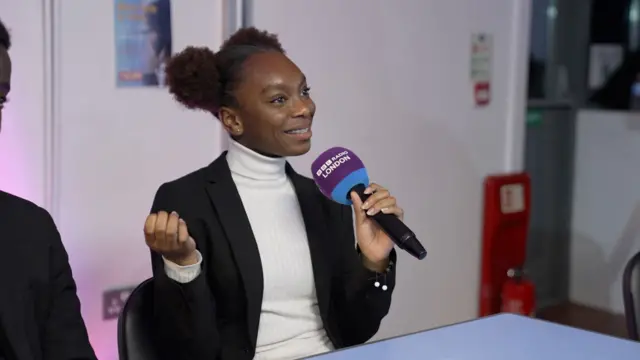
Keira, 17, thinks some young people see carrying a knife as a way to "protect themselves", adding that "carrying knives has become so glorified".
She condemned the carrying of blades.
Kara tells the debate how her brother was convicted and sentenced for a knife crime.
"When police finally caught him they raided his house, they raided his basement and there was just a drawer full of knives," she says.
She says he tells her "prison is more fun than being on the streets".
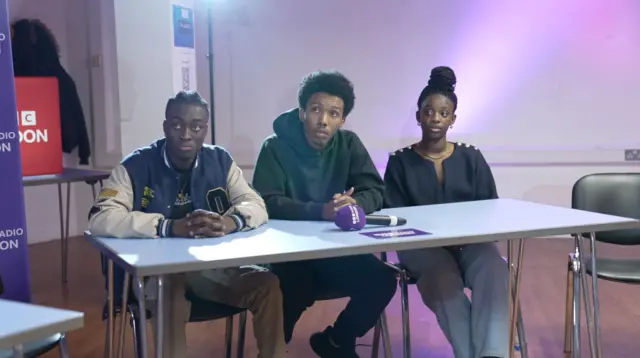
Marcus (centre)
"Somebody passed away that I knew quite well," says 20-year-old Marcus.
He is the third young person involved in the debate to use the term "passed away" to refer to a death by knife crime.
Eddie asks him: "When I think of passed away, I think of grandparents, I think of natural death, painful, but the circle of life. Why do you say passed away?"
To which Marcus replies: "When you come from areas that are deprived, it's just a cycle. Someone passing away like a grandparent, is also like your friend getting stabbed."
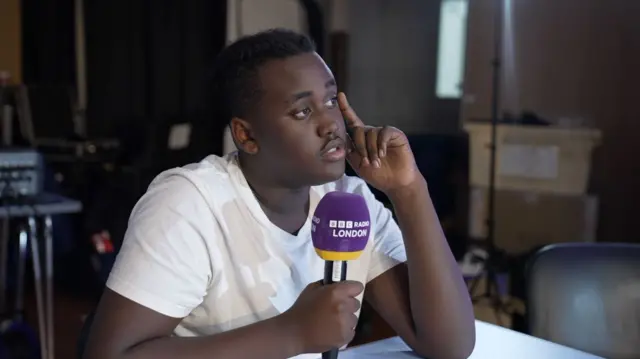
Heaven, 17, tells Eddie how his friend was stabbed and killed in December last year.
"Obviously it hurt," he says, "but kids our age, they're dying every day.
"He was a gang member. When he died, I was very upset and it hurt me, it broke me, but at the same time its a consequence of living that life.
"One day he was there, the next he was gone."
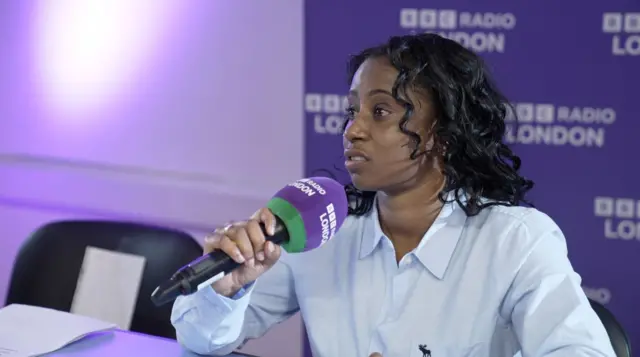
The debate's co-host Tilisha Goupall starts by speaking about how she lost her brother to knife crime in a case of mistaken identity six years ago.
"In 2017 my younger brother Jermaine was sadly murdered in Croydon," she said.
"Now I'm campaigning, I'm running a foundation that goes into primary schools and secondary schools to educate young people on knife crime and the consequences."
The debate has now begun.
For the first part we will hear from the participants about their own experiences of knife crime in London.
Photos of seized knives posted on social media by police can have a profound impact on some young people affected by violence, a study published earlier this year found.
Research by London's Violence Reduction Unit (VRU) into the impact of posting images of blades found they had little effect on many youngsters.
But some involved in the study said the pictures left them feeling fearful and unsafe about where they live.
The Met said it "shared images to highlight the work of our officers".
Last year, University of Strathclyde research found that sharing photographs of seized knives on social media risked creating "a culture of fear" and "perpetuating negative stereotypes".
After the debate Eddie will be taking your calls on solutions as he welcomes special guests to the studio, including the deputy mayor for policing, Sophie Linden.
Call 0800 731 2000
Email – eddie@bbc.co.uk
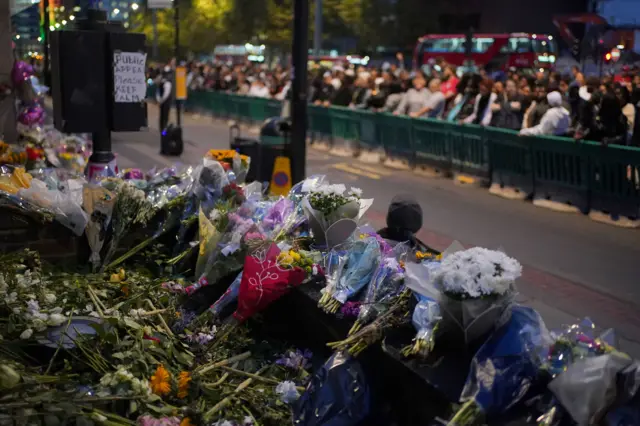 Image source, PA Media
Image source, PA MediaDuring 2023, 16 teenagers have been fatally stabbed in London. Two of them were girls, while the youngest was aged 15.
The 16 who have been killed are:
From about 10:00 BBC Radio London’s Eddie Nestor presents a debate with young people from across London about the impact of knife crime on their lives, and the solutions for tackling the issue.
We'll be hearing from 13 young people who are taking a stand against the problem.
Later we will hear from experts about what can be done reduce knife crime across the capital.
You can follow what happens here or listen to the programme live on BBC Sounds.